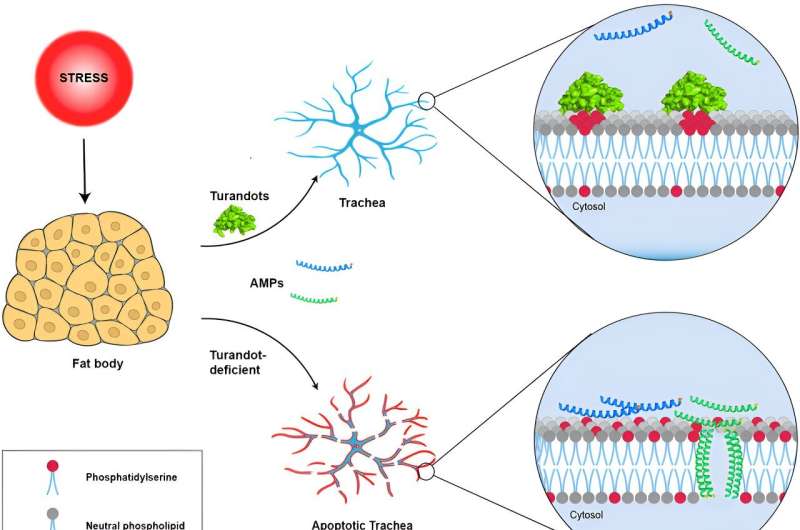This article has been reviewed according to Science X's editorial process and policies. Editors have highlighted the following attributes while ensuring the content's credibility:
fact-checked
peer-reviewed publication
trusted source
proofread
Researchers reveal the proteins that shield the body against its own immune attacks

Researchers at EPFL reveal how Drosophila's Turandot proteins protect against immune self-harm. The study is the first to identify some proteins that protect against antimicrobial peptides offering insights into cellular resilience mechanisms with potential therapeutic applications.
In the constant battle between organisms and pathogens, our immune system plays the role of a vigilant guardian. Yet, this defense can sometimes turn into a double-edged sword, harming the very tissues it's meant to protect.
Now, a study from the group of Bruno Lemaitre at EPFL sheds light on a novel aspect of this balance, focusing on the fruit fly, Drosophila melanogaster, and a family of proteins called Turandot (like Puccini's opera), known for being expressed during stress and immune responses but with unclear functions.
The study, published in Current Biology, shows how the Turandots protect against damage from the fruit fly's own immune system.
Drosophila, a model organism used widely in biological research, employs antimicrobial peptides (AMPs), which can destroy pathogens by disrupting their cell membranes. However, this can inadvertently damage the host's own cells, particularly when AMPs are produced in large quantities.
The EPFL study reveals the Turandot proteins bind to the membranes of host cells, particularly those in the respiratory epithelium, and shield them from the deleterious effects of AMPs. This protective mechanism is crucial for maintaining tissue integrity and ensuring the organism's survival under stress.
The researchers employed a range of sophisticated techniques including electrophysiology, lipid binding assays, and molecular dynamics simulations. These methods allowed them to observe the interactions between Turandot and cell membranes, highlighting how it preferentially binds to phosphatidylserine, a phospholipid that becomes exposed on cell surfaces under stress conditions. Turandot sequesters phosphatidylserine, thus preventing AMPs from attacking the host's cells.
The study not only advances our understanding of the immune system's intricacies but also highlights the evolutionary strategies organisms have developed to minimize self-inflicted harm during immune responses. The authors write, "To our knowledge, our study is the first to identify a class of molecules protecting animal cell from the action of antimicrobial peptides."
The findings could have broader implications, suggesting that similar protective mechanisms might exist in other organisms, including humans. This opens up potential therapeutic avenues, particularly in conditions where immune system overactivity can cause damage, such as in certain neurodegenerative diseases.
More information: Samuel Rommelaere et al, A humoral stress response protects Drosophila tissues from antimicrobial peptides, Current Biology (2024). DOI: 10.1016/j.cub.2024.02.049



















